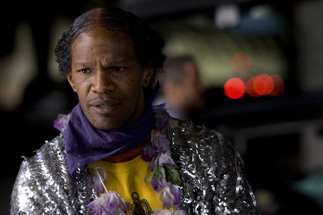Book vs. Movie: The Soloist
By Russ Bickerstaff
April 27, 2009
Book Vs. Movie: The Soloist
In this corner: the Book. A collection of words that represent ideas when filtered through the lexical systems in a human brain. From clay tablets to bound collections of wood pulp to units of stored data, the book has been around in one format or another for some 3,800 years.
And in this corner: the Movie. A 112-year-old kid born in France to a guy named Lumiere and raised primarily in Hollywood by his uncle Charlie "the Tramp" Chaplin. This young upstart has quickly made a huge impact on society, rapidly becoming the most financially lucrative form of storytelling in the modern world.
Both square off in the ring again as Box Office Prophets presents another round of Book vs. Film.
The Soloist
In 2005, LA Times Columnist Steve Lopez ran into a homeless man playing a violin on a street corner. After a few conversations with the gentleman, he decided the musician's situation was fascinating enough write about in his column. Evidently the man in question was Nathaniel Ayers - a talented musician who had bombed out of the prestigious Julliard Music School years ago and was now living on the dangerous streets of LA, suffering from schizophrenia. One column about Ayers led to another, and another. Before long the series had become popular enough that Lopez was working on a novel about Nathaniel. Even before Lopez's book was released, a number of people in the Hollywood film industry had already read Lopez's columns about Nathaniel and were interested in turning his story into a movie. Now, only a very brief amount of time after the novel was released, its big-budget film adaptation hits the screens. How do film and book treatments of Nathaniel Ayers' story compare?
The Book
Prior to meeting Nathaniel Ayers, Lopez had written a few books and literally hundreds of columns. Primarily a journalist, Lopez saw Ayers playing in the streets of LA on a violin with only two strings and realized that he had a story. The novel that came out of the columns about Ayers that he wrote for the LA Times follows the largely journalistic style of the columns.
In an admirably pragmatic style forged from a journalist's endless shower of pressing deadlines, Lopez relates the story of meeting Ayers. It's crisp, simple prose that recognizes the uniquely interesting nature of Ayers' story - the tragedy of mental illness and homelessness. From first encounter to subsequent meetings to visiting Ayers on Skid Row and beyond, we get a book that delivers information without embellishing the account with any unnecessary poetry or personification. While this is very admirable, it lacks the kind of inspiration that might've been found in a book by a more accomplished author of fiction.
Lopez carefully assembles the story of Ayers' past, weaving it deftly into his own personal journey in helping him out. We see the struggles of a man battling inner demons through the lens of a man whose desire to get the story across and genuinely make a difference keeps him from his wife and daughter. It's a very touching piece of journalism that is distanced enough from its own subject matter to show an impressive amount of complexity in the issues it's presenting. We see a man who was once a very promising concert musician get lost in his own psychosis under the overwhelming pressure of studying at such a high-caliber school. Lopez outlines his efforts to get Ayers back into a safe life indoors. Recovery from any kind of mental disorder NEVER happens in a straight line and Lopez does a pretty good job of illustrating the many breakthroughs and setbacks in Ayers' progress. Perhaps Lopez's biggest accomplishment in the course of the book is giving it a sense of resolution in the end while simultaneously making it perfectly clear that Ayers may never have a normal life the way mainstream society defines it.
Continued:
1
2
3
4




